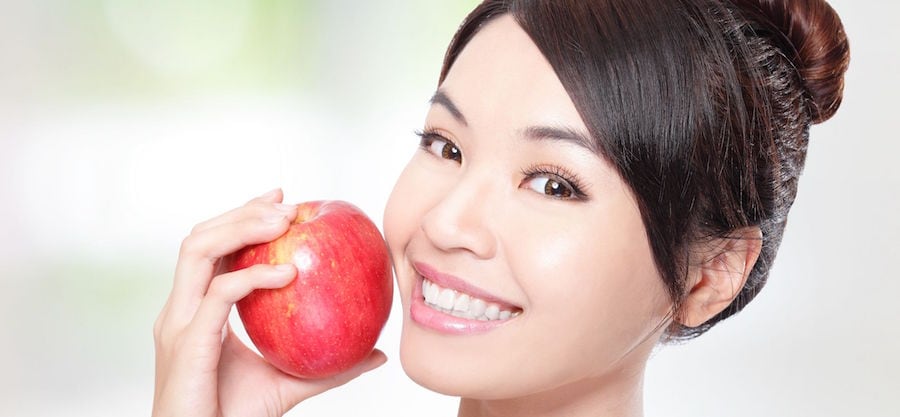Implementing just a few dietary habits can have a tremendous impact on the appearance and health of your skin. Utilizing healthy foods to nutritionally nourish the skin, as well as minimize the damaging processes of oxidative stress and glycation, can foster a more vibrant appearance.
Free radicals, or reactive oxygen species, formed from UV radiation, pollution, a normal metabolism, or other causes, can damage the biomolecules of the skin such as DNA, proteins (like collagen and elastin), and lipid.[1] These components of the skin, when undamaged, give us a youthful, unwrinkled, and firm appearance. But free radical damage can do away with youthful looks by causing direct molecular damage and also by triggering a cascade of events that further degrades the components of healthy skin.[2]
What can you do? Here are my top two tips for supporting healthy skin through simple nutritional choices:
#1 Protect and Nourish with Antioxidants
Eating right is the first line of defense against free radical damage. Dietary antioxidants are key in protecting your skin and giving it a healthy appearance. Plant-derived antioxidants like vitamin E, vitamin C, carotenoids, and flavonoids can nourish the antioxidant defenses of the body.
Eating a colorful variety of whole plant foods like vegetables, fruits, nuts, and grains provides a foundation of robust antioxidant protection of the body, including the skin. Consuming these foods can also nourish the appearance and structural components of the skin.
Some of these plant antioxidants play such a direct role in skin protection that they are actually stored in the skin. For instance, carotenoids found in fruits and vegetables, can be measured in skin throughout the human body, and are found in the highest concentrations in the face.[3] Because of their presence in the skin, carotenoids are thought to prevent oxidative damage to the skin, including oxidative sun damage.[4]
Ingested carotenoids have been confirmed to accumulate in skin in numerous studies, and facial concentrations of ingested carotenoids can actually change the complexion of the skin to a healthy glow, and make a person appear healthier to others.[5],[6] And who would say no to that?
Other antioxidants like flavonoids can be skin-protective. For instance, green tea can prevent oxidative damage and inhibit enzymes that break down skin components like collagen.[7]
Vitamin E, found mostly in nuts, seeds, and grains, plays an important role in stabilizing and protecting the fatty cell membranes from oxidative damage. This vitamin has been shown, through both oral and topical administration, to strengthen skin barrier function and offer some protection against sun damage.[8]
Vitamin E also helps the skin retain moisture and smoothness.[9]
Consuming enough vitamin C is crucial for the synthesis of the skin-firming protein collagen and for ensuring its proper and strong structure.[10] Vitamin C deficiency causes a plethora of skin malfunctions including fragility.[11]
#2 Limit Certain Foods that Directly Damage the Skin
Glycation, the other way in which skin is damaged, involves the modification of skin proteins like collagen and elastin by the attachment of simple sugars like glucose and fructose. Put simply, sugars attach to skin proteins and make them stiff and wrinkled. People with chronically elevated blood sugar, like diabetics, have much higher amounts of glycated proteins in their bodies.[12]
If you want to minimize glycation damage to your skin, stay away from large amounts of refined carbohydrates or artificially sugary foods to prevent high blood sugar. Instead, focus on eating low-glycemic, whole plant foods like veggies, nuts, fruit, and whole grains. Your skin will look much better if you do!
Our bodies can also accumulate already-glycated proteins from the food we eat. Foods rich in protein or fat that are cooked at high temperatures and in dry conditions typically contain a lot of advanced glycation end products (AGEs).[13] These AGEs—usually found in high amounts in animal products or nuts that are baked, roasted, fried, grilled, seared, or broiled—can be absorbed into tissues after consumption.[14]
Simple eating habits can make a big impact on how many AGEs you absorb into your tissues, most likely including your skin. Eating raw instead of roasted nuts and seeds and limiting meat (or eating meat that has been cooked at lower temperatures in a marinade or water) can dramatically lower AGE content. Steaming, poaching, and boiling meat will yield less AGEs. And having the bulk of your diet consist of vegetables, fruit, and whole grains will lower your AGE intake, as these foods are very low in AGEs. [15]
Use these simple dietary tips to make your skin healthy and keep it looking good for years to come!
Disclosure of Material Connection: I am a guest blogger and graduate of American College of Healthcare Sciences, the Institution that publishes this blog. However, all opinions are my own. This blog may contain affiliate links. I am disclosing this in accordance with the Federal Trade Commission’s 16 CFR, Part 255: “Guides Concerning the Use of Endorsements and Testimonials in Advertising.”
This article is for informational purposes only. It is not intended to treat, diagnose, cure, or prevent disease. This article has not been reviewed by the FDA. Always consult with your primary care physician or naturopathic doctor before making any significant changes to your health and wellness routine.
[1] Evans, J. A., & Johnson, E. J. (2010). The role of Phytonutrients in skin health. Nutrients, 2(8), 903–928. Retrieved from https://www.ncbi.nlm.nih.gov/pmc/articles/PMC3257702/
[2] Ibid.
[3] Ibid.
[4] Ibid.
[5] Tan, K., Graf, B., Mitra, S., & Stephen, I. (2015). Daily consumption of a fruit and vegetable Smoothie alters facial skin color. PloS one, 10(7), . Retrieved from https://www.ncbi.nlm.nih.gov/pubmed/26186449
[6] Whitehead, R., Ozakinci, G., & Perrett, D. (2012). Attractive skin coloration: Harnessing sexual selection to improve diet and health. Evolutionary psychology : an international journal of evolutionary approaches to psychology and behavior, 10(5), 842–54. Retrieved from https://www.ncbi.nlm.nih.gov/pubmed/23253790
[7] Schagen, S. K., Zampeli, V. A., Makrantonaki, E., & Zouboulis, C. C. (2012). Discovering the link between nutrition and skin aging. Dermato Endricronology, 4(3), 298–307. Retrieved from https://www.ncbi.nlm.nih.gov/pmc/articles/PMC3583891/
[8] Thiele, J., & Ekanayake-Mudiyanselage, S. (2007). Vitamin E in human skin: Organ-specific physiology and considerations for its use in dermatology. Molecular aspects of medicine., 28(5-6), 646–67. Retrieved from https://www.ncbi.nlm.nih.gov/pubmed/17719081/
[9] Ganceviciene, R., Liakou, A. I., Theodoridis, A., Makrantonaki, E., & Zouboulis, C. C. (2012). Skin anti-aging strategies. Dermato Endrocrinology, 4(3), 308–319. Retrieved from https://www.ncbi.nlm.nih.gov/pmc/articles/PMC3583892/
[10] Ganceviciene, R., Liakou, A. I., Theodoridis, A., Makrantonaki, E., & Zouboulis, C. C. (2012). Skin anti-aging strategies. Dermato Endrocrinology, 4(3), 308–319. Retrieved from https://www.ncbi.nlm.nih.gov/pmc/articles/PMC3583892/
[11] Schagen, S. K., Zampeli, V. A., Makrantonaki, E., & Zouboulis, C. C. (2012). Discovering the link between nutrition and skin aging. Dermato Endricronology, 4(3), 298–307. Retrieved from https://www.ncbi.nlm.nih.gov/pmc/articles/PMC3583891/
[12] Negre-Salvayre, A., Salvayre, R., Augé, N., Pamplona, R., & Portero-Otín, M. (2009b). Hyperglycemia and glycation in diabetic complications. Antioxidants & redox signaling., 11(12), 3071–109. Retrieved from https://www.ncbi.nlm.nih.gov/pubmed/19489690
[13] Uribarri, J., Woodruff, S., Goodman, S., Cai, W., Chen, X., Pyzik, R., … Vlassara, H. (2010). Advanced glycation end products in foods and a practical guide to their reduction in the diet. Journal of the American Dietetic Association., 110(6), 911–16. Retrieved from https://www.ncbi.nlm.nih.gov/pubmed/20497781
[14] Ibid.
[15] Ibid.



